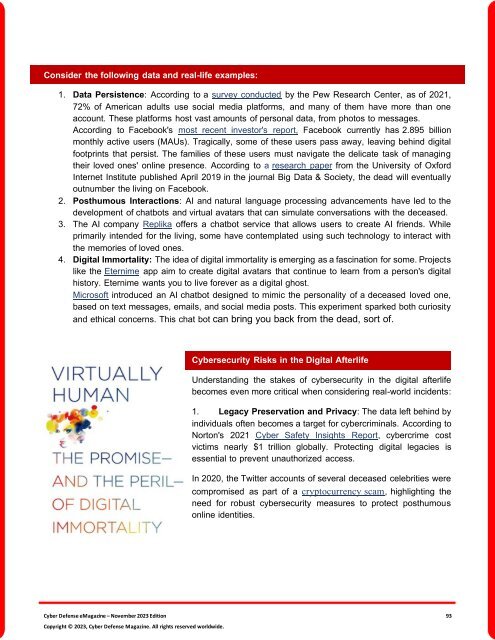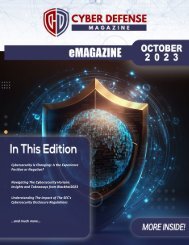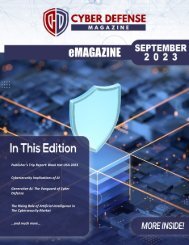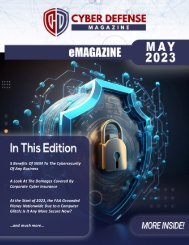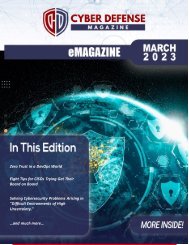The Cyber Defense eMagazine November Edition for 2023
Cyber Defense eMagazine November Edition for 2023 #CDM #CYBERDEFENSEMAG @CyberDefenseMag by @Miliefsky a world-renowned cyber security expert and the Publisher of Cyber Defense Magazine as part of the Cyber Defense Media Group as well as Yan Ross, Editor-in-Chief and many more writers, partners and supporters who make this an awesome publication! 196 page November Edition fully packed with some of our best content. Thank you all and to our readers! OSINT ROCKS! #CDM #CDMG #OSINT #CYBERSECURITY #INFOSEC #BEST #PRACTICES #TIPS #TECHNIQUES
Cyber Defense eMagazine November Edition for 2023 #CDM #CYBERDEFENSEMAG @CyberDefenseMag by @Miliefsky a world-renowned cyber security expert and the Publisher of Cyber Defense Magazine as part of the Cyber Defense Media Group as well as Yan Ross, Editor-in-Chief and many more writers, partners and supporters who make this an awesome publication! 196 page November Edition fully packed with some of our best content. Thank you all and to our readers! OSINT ROCKS! #CDM #CDMG #OSINT #CYBERSECURITY #INFOSEC #BEST #PRACTICES #TIPS #TECHNIQUES
You also want an ePaper? Increase the reach of your titles
YUMPU automatically turns print PDFs into web optimized ePapers that Google loves.
Consider the following data and real-life examples:<br />
1. Data Persistence: According to a survey conducted by the Pew Research Center, as of 2021,<br />
72% of American adults use social media plat<strong>for</strong>ms, and many of them have more than one<br />
account. <strong>The</strong>se plat<strong>for</strong>ms host vast amounts of personal data, from photos to messages.<br />
According to Facebook's most recent investor's report, Facebook currently has 2.895 billion<br />
monthly active users (MAUs). Tragically, some of these users pass away, leaving behind digital<br />
footprints that persist. <strong>The</strong> families of these users must navigate the delicate task of managing<br />
their loved ones' online presence. According to a research paper from the University of Ox<strong>for</strong>d<br />
Internet Institute published April 2019 in the journal Big Data & Society, the dead will eventually<br />
outnumber the living on Facebook.<br />
2. Posthumous Interactions: AI and natural language processing advancements have led to the<br />
development of chatbots and virtual avatars that can simulate conversations with the deceased.<br />
3. <strong>The</strong> AI company Replika offers a chatbot service that allows users to create AI friends. While<br />
primarily intended <strong>for</strong> the living, some have contemplated using such technology to interact with<br />
the memories of loved ones.<br />
4. Digital Immortality: <strong>The</strong> idea of digital immortality is emerging as a fascination <strong>for</strong> some. Projects<br />
like the Eternime app aim to create digital avatars that continue to learn from a person's digital<br />
history. Eternime wants you to live <strong>for</strong>ever as a digital ghost.<br />
Microsoft introduced an AI chatbot designed to mimic the personality of a deceased loved one,<br />
based on text messages, emails, and social media posts. This experiment sparked both curiosity<br />
and ethical concerns. This chat bot can bring you back from the dead, sort of.<br />
<strong>Cyber</strong>security Risks in the Digital Afterlife<br />
Understanding the stakes of cybersecurity in the digital afterlife<br />
becomes even more critical when considering real-world incidents:<br />
1. Legacy Preservation and Privacy: <strong>The</strong> data left behind by<br />
individuals often becomes a target <strong>for</strong> cybercriminals. According to<br />
Norton's 2021 <strong>Cyber</strong> Safety Insights Report, cybercrime cost<br />
victims nearly $1 trillion globally. Protecting digital legacies is<br />
essential to prevent unauthorized access.<br />
In 2020, the Twitter accounts of several deceased celebrities were<br />
compromised as part of a cryptocurrency scam, highlighting the<br />
need <strong>for</strong> robust cybersecurity measures to protect posthumous<br />
online identities.<br />
<strong>Cyber</strong> <strong>Defense</strong> <strong>eMagazine</strong> – <strong>November</strong> <strong>2023</strong> <strong>Edition</strong> 93<br />
Copyright © <strong>2023</strong>, <strong>Cyber</strong> <strong>Defense</strong> Magazine. All rights reserved worldwide.


